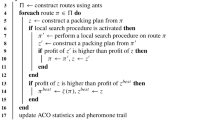Abstract
In this work we address the Hop-Constrained Minimum cost Flow Spanning Tree (HMFST) problem with nonlinear costs. The HMFST problem is an extension of the Hop-Constrained Minimum Spanning Tree problem since it considers flow requirements other than unit flows. We propose a hybrid heuristic, based on ant colony optimization and on local search, to solve this class of problems given its combinatorial nature and also that the total costs are nonlinearly flow dependent with a fixed-charge component. We solve a set of benchmark problems available online and compare the results obtained with the ones reported in the literature for a Multi-Population hybrid biased random key Genetic Algorithm (MPGA). Our algorithm proved to be able to find an optimum solution in more than 75 % of the runs, for each problem instance solved, and was also able to improve on many results reported for the MPGA. Furthermore, for every single problem instance we were able to find a feasible solution, which was not the case for the MPGA. Regarding running times, our algorithm improves upon the computational time used by CPLEX and was always lower than that of the MPGA.

Similar content being viewed by others
References
Akgun, I., Tansel, B.C.: New formulations of the hop-constrained minimum spanning tree problem via miller-tucker-zemlin constraints. Eur. J. Oper. Res. 212, 263–276 (2011)
Altiparmak, F., Karaoglan, I.: A genetic ant colony optimization approach for concave cost transportation problems. In: IEEE Congress on Evolutionary Computation, 2007. CEC 2007, pp. 1685–1692 (2007).
Beasley, J.: Or-library. http://www.brunel.ac.uk/deps/ma/research/jeb/orlib/netflowccinfo.html (2010)
Bin, Y., Zhong-Zhen, Y., Baozhen, Y.: An improved ant colony optimization for vehicle routing problem. Eur. J. Oper. Res. 196, 171–176 (2009)
Burkard, R.E., Dell’Amico, M., Martello, S.: Assignment problems. Siam (2009).
Cordon, O., Herrera, F., Stützle, T.: A review on the ant colony optimization metaheuristic: basis, models and new trends. Mathw. Soft. Comput. 9, 141–175 (2002)
Dang, C., Sun, Y., Wang, Y., Yang, Y.: A deterministic annealing algorithm for the minimum concave cost network flow problem. Neural Netw. 24, 69–708 (2011)
Dorigo, M., Stützle, T.: Ant colony optimization. MIT Press, Cambridge (2004)
Fontes, D.B.M.M.: Optimal hop-constrained trees for nonlinear cost flow networks. INFOR 48, 13–21 (2010)
Fontes, D.B.M.M., Gonçalves, J.F.: Heuristic solutions for general concave minimum cost network flow problems. Networks 50, 67–76 (2007)
Fontes, D.B.M.M., Gonçalves, J.F.: A multi-population hybrid biased random key genetic algorithm for hop-constrained trees in nonlinear cost flow networks. Optim. Lett. 7, 1303–1324 (2012)
Fontes, D.B.M.M., Hadjiconstantinou, E., Christofides, N.: Upper bounds for single-source uncapacitated concave minimum-cost network flow problems. Networks 41(4), 221–228 (2003)
García-Martínez, C., Cordón, O., Herrera, F.: A taxonomy and an empirical analysis of multiple objective ant colony optimization algorithms for the bi-criteria TSP. Eur. J. Oper. Res. 180(1), 116–148 (2007)
Gouveia, L., Martins, P.: The capacitated minimal spanning tree problem: an experiment with a hop-indexed model. Ann. Oper. Res. 86, 271–294 (1999)
Gouveia, L., Paias, A., Sharma, D.: Restricted dynamic programming based neighborhoods for the hop-constrained minimum spanning tree problem. J. Heuristics 17, 23–37 (2011a)
Gouveia, L., Requejo, C.: A new lagrangean relaxation approach for the hop-constrained minimum spanning tree problem. Eur. J. Oper. Res. 132, 539–552 (2001)
Gouveia, L., Simonetti, L., Uchoa, E.: Modeling hop-constrained and diameter-constrained minimum spanning tree problems as steiner tree problems over layered graphs. Math. Prog. 128, 123–148 (2011b)
Kim, D.: Piecewise linear network flow problems. In: Floudas, C.A., Pardalos, P.M. (eds.) Encyclopedia of Optimization. Kluwer Academic, Dordrechtr (2003)
Kiran, M.S., Gunduz, M., Baykan, O.K.: A novel hybrid algorithm based on particle swarm and ant colony optimization for finding the global minimum. Appl. Math. Comput. 219, 1515–1521 (2012)
Liao, T.W., Kuo, R.J., Hu, J.T.L.: Hybrid ant colony optimization algorithms for mixed discrete-continuous optimization problems. Appl. Math. Comput. 219, 3241–3252 (2012)
Monteiro, M.S.R.: Ant colony optimization algorithms to solve nonlinear network flow problems. Ph.D. thesis, Faculdade de Economia da Universidade do Porto, Porto, Portugal (2012)
Monteiro, M.S.R., Fontes, D.B.M.M., Fontes, F.A.C.C.: Concave minimum cost network flow problems solved with a colony of ants. J. Heuristics 19, 1–33 (2013a)
Monteiro, M.S.R., Fontes, D.B.M.M., Fontes, F.A.C.C.: Solving hop-constrained MST problems with ACO. Working paper, N493, Universidade do Porto, Faculdade de Economia (2013b)
Mullen, R., Monekosso, D., Barman, S., Remagnino, P.: A review of ant algorithms. Expert. Syst. Appl. 36, 9608–9617 (2009)
Putha, R., Quadrifoglio, L., Zechman, E.: Comparing ant colony optimization and genetic algorithm approaches for solving traffic signal coordination under oversaturation conditions. Comput-Aided Civ. Infrastruct. Eng. 27, 14–28 (2012)
Stützle, T., Hoos, H.: Max-min ant system and local search for the traveling salesman problem. In: IEEE International Conference On Evolutionary Cmputation (ICEC’97), pp. 309–314. IEEE Press, Piscataway (1997)
Tseng, S., Lin, C., Huang, Y.: Ant colony-based algorithm for constructing broadcasting tree with degree and delay constraints. Expert. Syst. Appl. 35, 1473–1481 (2008)
Wang, H., Shi, Z., Li, S.: Multicast routing for delay variation bound using a modified ant colony algorithm. J. Netw. Comput. Appl. 32, 258–272 (2008)
Yin, P.Y., Wang, J.Y.: Ant colony optimization for the nonlinear resource allocation problem. Appl. Math. Comput. 174, 1438–1453 (2006)
Acknowledgments
This work is partially funded by ERDF (FEDER), the COMPETE through the FCT as part of projects PTDC/EGE-GES/099741/2008 and PTDC/EEA-CRO/116014/2009 and the North Portugal Regional Operational Programme (ON.2O Novo Norte) under the National Strategic Reference Framework.
Author information
Authors and Affiliations
Corresponding author
Rights and permissions
About this article
Cite this article
Monteiro, M.S.R., Fontes, D.B.M.M. & Fontes, F.A.C.C. The hop-constrained minimum cost flow spanning tree problem with nonlinear costs: an ant colony optimization approach. Optim Lett 9, 451–464 (2015). https://doi.org/10.1007/s11590-014-0762-6
Received:
Accepted:
Published:
Issue Date:
DOI: https://doi.org/10.1007/s11590-014-0762-6




